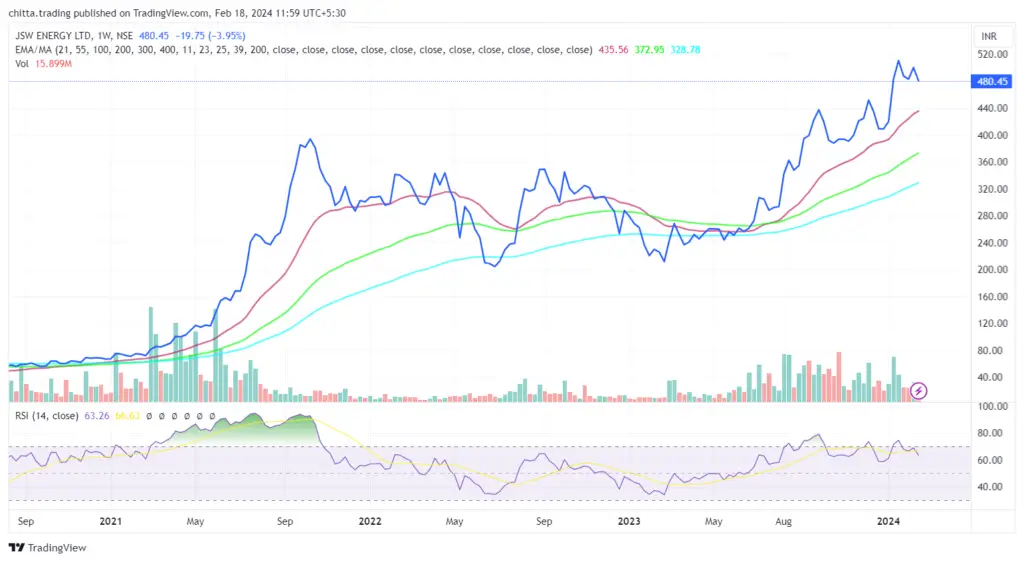The energy situation in India is changing a lot. More people need energy, and there’s a focus on using more renewable sources and reducing carbon emissions. JSW Energy, a big private power company, is getting attention in this changing environment. But is it a good investment for people who want to invest for a long time? To decide, we need to look closely at the company’s money matters and what might happen in the future.
Company Overview
This is a company that is part of the JSW Group. They have different kinds of power plants – some that use heat and others that use sunlight – and together, they can produce more than 4,700 megawatts of electricity. This company works in 14 different states in India and provides power to various types of customers like industries, utilities, and businesses. People recognize company for being good at running their operations, having a strong financial performance, and caring about sustainability.
- Generation Portfolio: Company boasts a 10 GW generation portfolio, with 61% of its capacity coming from renewable sources.
- Vision for 2030: The company targets a 20 GW generation capacity, with 40 GWh of storage capacity and 1 GW of photovoltaic (PV) module manufacturing capacity by April 2025.
Shareholder Details
- JSW Energy Limited: Holds 18.94% of the company’s shares.
- Indusglobe Multiventures Pvt Ltd.: Owns 15.56% of the shares.
- Siddeshwari Tradex Pvt Ltd.: Holds 14.04% of the shares.
- Life Insurance Corporation of India (Investment Portfolio): Has a 9.071% stake.
Current Share Price
As of the latest update, Company share price stands at ₹480.45. Keep in mind that stock prices can fluctuate, so it’s essential to stay informed.

Highlights from Recent Conference Calls
Let’s peek into some key takeaways from Company’s recent earnings calls:
- Q2 FY24 Earnings Call (October 2023):
- High Power Demand and Deficit: The surge in power demand (30% growth in Q2) led to high power deficits, reminiscent of levels seen in 2004-2006.
- Renewable Focus: Company continues to emphasize renewable energy sources.
- Q1 FY24 Earnings Call (July 2023):
- Robust Performance: Company reported strong performance in Q1FY24.
- Renewables Thriving: The company’s renewables segment contributed significantly.
- Q3 FY23 Earnings Call (January 2023):
- Performance and Outlook: Company management discussed Q3FY23 results and future prospects.
Current Investments and Ongoing Projects
- Baspa Hydroelectric Plant: Located in the Himalayas, this plant generates around 300 MW.
- Karcham Wangtoo Plant: Situated on the Satluj River in Himachal Pradesh, it has a capacity of approximately 1091 MW.
- Barmer Plant: Close to lignite mines in Kapurdi and Jalipa.
- Vijayanagar Plant: Consists of two business units.
Recent Investment in Odisha
Company’s recent acquisition of a 50% stake in Odisha Discom Private Limited (ODPL) for ₹5,312 crore marks a significant step into the distribution segment. This strategic move opens up new growth avenues and strengthens the company’s presence in the Eastern Indian market.
Pros and Cons of Investing
Pros:
- Strong track record of operational excellence and financial performance.
- Diversified portfolio with a focus on renewable energy expansion.
- Experienced management team and strong parent company support.
- Recent foray into the distribution segment offers new growth opportunities.
Cons:
- High dependence on the thermal power business, which faces regulatory and environmental headwinds.
- Competitive landscape in the Indian power sector.
- Valuation concerns, with the stock currently trading at a premium.
Common Search
Is JSW Energy a Good Long-Term Buy?
Deciding to invest in JSW Energy depends on how much risk you’re okay with and how long you plan to invest. If you want to invest for a long time and be part of the growing Indian power sector that cares about the environment, JSW Energy might be a good choice. But, keep in mind that there are risks with the thermal power business and competition that you should think about.
What is JSW full form?
JSW stands for Jindal South West. It’s an Indian company group, and it’s one of the biggest business groups in the country.
What is the dividend history of JSW Energy?
Company has consistently rewarded its shareholders through dividends.
Since June 29, 2010, the company has declared 13 dividends.
In the past 12 months, Company has declared an equity dividend amounting to ₹2.00 per share.
At the current share price of ₹482.90, JSW Energy Ltd.’s dividend yield stands at 0.41%.
What Are RECs?
REC is Renewable Energy Certificates (RECs).
RECs certify that the bearer owns one megawatt-hour (MWh) of electricity generated from a renewable energy resource.
When a power provider feeds energy into the grid from renewable sources (such as solar, wind, or hydro), they receive RECs.
These RECs can then be sold on the open market as an energy commodity.
In summary, RECs bridge the gap between renewable energy generation and consumption. They empower individuals and organizations to contribute to a greener future
How Do RECs Work?
Imagine a wind farm generating clean electricity. For every MWh produced, the wind farm receives a REC.
The wind farm can either use the REC to demonstrate its renewable energy commitment or sell it to another entity.
Buyers (such as companies or utilities) purchase RECs to offset their non-renewable energy consumption.
By buying RECs, these entities indirectly support renewable energy projects.
Why Are RECs Important?
Environmental Impact: RECs encourage investment in renewable energy infrastructure, reducing reliance on fossil fuels.
Market Incentives: They create a market demand for clean energy, driving growth in the renewable sector.
Economic Support: Revenue from selling RECs helps renewable energy projects stay financially viable.
What are the type of RECs?
Solar RECs: Represent solar energy generation.
Non-Solar RECs: Cover other renewable sources like wind, hydro, and biomass.
What is the current market capitalization of JSW Energy?
As of February 18, 2024, company has a market capitalization of approximately ₹78,850.72 crore (which is approximately $9.89 billion). This valuation reflects the company’s position in the power generation and distribution sector. Keep in mind that market capitalization can fluctuate based on market conditions and investor sentiment.
what you should consider before making an investment decision
- Your investment horizon: Long-term investors can potentially benefit from the company’s growth plans and expansion into renewables.
- Risk tolerance: The thermal power business exposes the company to regulatory and environmental risks.
- Valuation: The current valuation might seem stretched, so wait for potential corrections
What are the risks of investing ?
- Market Risks:
- Sector Risks: The energy sector is influenced by government policies, global energy prices, and technological advancements. Changes in these factors can impact Company’s performance.
- Regulatory Risks:
- Policy Changes: Government policies related to renewable energy, tariffs, subsidies, and environmental regulations can affect Company’s operations and profitability.
- Renewable Energy Certificates (RECs): Company’s revenue from RECs depends on regulatory support and market demand.
- Operational Risks:
- Project Delays: Delays in project execution (such as new power plants or expansions) can impact revenue and profitability.
- Maintenance and Efficiency: Efficient plant operations and regular maintenance are crucial. Any operational disruptions can affect financial performance.
- Financial Risks:
- Debt Burden: Company’s debt levels can impact its financial health. High debt may lead to interest payment pressure.
- Interest Rate Fluctuations: Changes in interest rates can affect borrowing costs and debt repayment.
- Market Demand and Supply:
- Power Demand: Company’s revenue depends on electricity demand. A slowdown in industrial activity or economic downturn can reduce demand.
- Competition: The energy sector is competitive. Company competes with other power producers for market share.
- Environmental and Social Risks:
- Environmental Compliance: Any violations or environmental damage can lead to legal and reputational risks.
- Community Relations: Social acceptance and community relations are essential for project development.
- Technology Risks:
- Renewable Technology: Company’s focus on renewables involves technological risks. Advances in solar, wind, or storage tech can impact competitiveness.
How does JSW Energy compare to other power companies in India?
- JSW Energy Ltd:
- Market Cap: ₹59,444.83 crore
- Close Price: ₹362.35
- PE Ratio: 40.23
- 1-Month Return: 25.08%
- 5-Year CAGR: 39.97%
- 5-Year Avg Net Profit Margin: 12.70%
- ROCE: 7.07%
- Insight: Company is a mid-cap integrated power company primarily engaged in generation and sale of power. Over the last 5 years, the company has demonstrated robust revenue growth (10.57% yearly) and impressive net income expansion (80.11%) compared to industry averages. The stock ranks well in profitability and efficiency1.
- Adani Power Ltd:
- Market Cap: ₹1,17,482.36 crore
- Close Price: ₹304.60
- PE Ratio: 10.95
- 1-Month Return: 23.54%
- 5-Year CAGR: 57.68%
- 5-Year Avg Net Profit Margin: 6.61%
- ROCE: 16.17%
- Insight: Adani Power provides electric power generation through coal-based thermal power plants and coal trading. Recent months have seen signs of recovery, with a strong revenue growth (15.33% yearly) compared to industry averages1.


- NTPC Ltd:
- Market Cap: ₹2,08,623.77 crore
- Close Price: ₹215.15
- PE Ratio: 12.34
- 1-Month Return: 14.84%
- 5-Year CAGR: 10.32%
- 5-Year Avg Net Profit Margin: 11.42%
- ROCE: 9.81%
- Insight: NTPC, a major player, operates in the power generation sector. While its growth rates are moderate, it remains a stable choice for investors1.

- Gujarat Industries Power Company Ltd:
- Market Cap: ₹1,737.88 crore
- Close Price: ₹114.90
- PE Ratio: 9.21
- 1-Month Return: 5.51%
- 5-Year CAGR: 4.98%
- 5-Year Avg Net Profit Margin: 14.00%
- ROCE: 7.17%
- Insight: Gujarat Industries Power Company focuses on power generation. Its financials indicate steady growth and a healthy net profit margin.
In summary, JSW stands out with its impressive revenue growth, net income expansion, and efficient performance. Adani Power shows signs of recovery, while NTPC remains a stable choice. Investors should consider their risk appetite and long-term goals when evaluating these power companies
How does Company plan to achieve its renewable energy targets?
- Net Zero Company by 2050:
- Company aims to become a Net Zero company before 2050.
- By capitalizing on India’s growing appetite for emissions reduction, they intend to achieve this ahead of the stated timeline of FY 2025.
- Their goal is to become a 10 GW generating company, primarily driven by renewables.
- 2030 Targets:
- Renewable Energy Share: JSW Energy plans to increase the renewable energy share in its power generation portfolio to 85% by 2030 (up from 52% in FY 2022-23).
- Storage Capacity: They are evaluating emerging technologies such as energy storage, utilization of green hydrogen, ammonia, and derivatives (ethanol, methanol, SAF).
- Solar Module Manufacturing: The company aims for a 1 GW per year solar module manufacturing capacity by April 2025.
- Green Hydrogen Production: JSW Energy targets a green hydrogen production capacity of 3,800 tonnes per annum by 2025.
- Climate Stewardship and Adaptation:
- JSW Energy recognizes climate change risks and systematically identifies threats to its business.
- The organization adopts strategic plans to perform reliably under various conditions.
- Carbon Footprint Reduction:
- JSW Energy is committed to a 50% reduction in carbon footprint by 2030.

Conclusion
JSW Energy is a big company in India that works in the power industry. They have done well in the past and have big plans for the future. Even though there are some risks, the company is looking at renewable energy, growing their business, and getting into distribution, which could be good for people who want to invest for the long term. But, before you decide to invest, it’s important to do some research and think about how much risk you are comfortable with.
Disclaimer: This blog is for informational purposes only and should not be considered financial advice. Please consult with a qualified financial advisor before making any investment decisions.
Must Read






